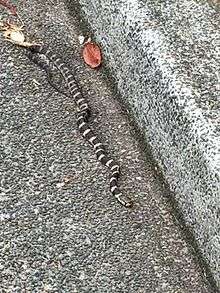Hoplocephalus stephensii
Hoplocephalus stephensii is a species of highly venomous tree snake in the family Elapidae. Its common name is Stephens' Banded Snake.[2] The species is endemic to Australia.
| Hoplocephalus stephensii | |
|---|---|
_(10559871275).jpg) | |
| Scientific classification | |
| Kingdom: | Animalia |
| Phylum: | Chordata |
| Class: | Reptilia |
| Order: | Squamata |
| Suborder: | Serpentes |
| Family: | Elapidae |
| Genus: | Hoplocephalus |
| Species: | H. stephensii |
| Binomial name | |
| Hoplocephalus stephensii Krefft, 1869 | |
Habitat
The preferred natural habitat of H. stephensii is forest,[1] where it resides within hollowed trees.[3]
Etymology
The specific name stephensii, is in honor of Australian academic William John Stephens.[4]
Geographic range
H. stephensii is found along the east coast of Australia between southern Queensland and Sydney.[5][2]

Stephens' Banded Snake on roadside.
Description
Laterally, the ventrals of H. stephensii are strongly angulate and notched.[6] These notched "keels" are used in climbing trees.[7]
Reproduction
H. stephensii is viviparous.[8]
gollark: Sometimes you do actually want a laptop.
gollark: Optiplexen are desktops, no?
gollark: I can't tell if that's a joke, but it's not actually comparable to real local storage.
gollark: It generates kerbal names or something.
gollark: I've released my random scripts and stuff here for any vaguely curious and/or extremely bored people: https://github.com/osmarks/random-stuff
References
- Shine R, Shea G, Greenlees M, Cogger H (2018). "Hoplocephalus stephensii ". The IUCN Red List of Threatened Species 2018: e.T177574A83768293. https://dx.doi.org/10.2305/IUCN.UK.2018-1.RLTS.T177574A83768293.en. Downloded on 16 June 2020.
- "Stephens' Banded Snake profile". NSW Department of Planning, Industry and Environment. 21 June 2018. Retrieved 29 June 2020.
- Fitzgerald, Mark; Shine, Richard; Lemckert, Francis; Towerton, Alison (2005). "Habitat requirements of the threatened snake species Hoplocephalus stephensii (Elapidae) in eastern Australia". Austral Ecology. 30 (4): 465–474. doi:10.1111/j.1442-9993.2005.01489.x.
- Beolens, Bo; Watkins, Michael; Grayson, Michael (2011). The Eponym Dictionary of Reptiles. Baltimore: Johns Hopkins University Press. xiii + 296 pp. ISBN 978-1-4214-0135-5. (Hoplocephalus stephensii, p. 253).
- "Stephens' Banded Snake". Queensland Museum. Retrieved 1 February 2017.
- Boulenger (1896).
- Waite ER (1905). "Climbing Habits of an Australian Snake". Records of the Australian Museum 6 (1): 38.
- Species Hoplocephalus stephensii at The Reptile Database www.reptile-database.org.
Further reading
- Boulenger GA (1896). Catalogue of the Snakes in the British Museum (Natural History). Volume III., Containing the Colubridæ (Opisthoglyphæ and Proteroglyphæ) ... London: Trustees of the British Museum (Natural History). (Taylor and Francis, printers). xiv + 727 pp. + Plates I-XXV. (Hoplocephalus stephensii, p. 350).
- Cogger HG (2014). Reptiles and Amphibians of Australia, Seventh Edition. Clayton, Victoria, Australia: CSIRO Publishing. xxx + 1,033 pp. ISBN 978-0643100350. (Hoplocephalus stephensii, p. 902).
- Krefft G (1869). The Snakes of Australia; an Illustrative and Descriptive Catalogue of All the Known Species. Sydney: Thomas Richards, Government Printer. xxv + 100 pp. + Plates I-XII. (Hoplocephalus stephensii, new species, pp. 58–59 + Plate VI, figure 7).
- Wilson, Steve; Swan, Gerry (2013). A Complete Guide to Reptiles of Australia, Fourth Edition. Sydney: New Holland Publishers. 522 pp. ISBN 978-1921517280.
This article is issued from Wikipedia. The text is licensed under Creative Commons - Attribution - Sharealike. Additional terms may apply for the media files.
